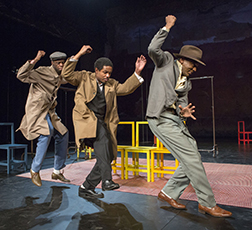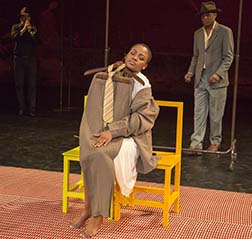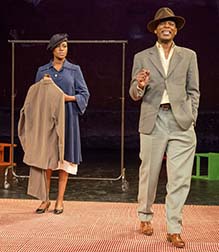By Lucy Komisar
With a minimalist set of a dozen sometimes up-ended pastel colored wood chairs as furniture and metal clothes trolleys to represent doors and windows, “The Suit,” presented at BAM by Peter Brook and his long-time collaborator Marie-Hél¨ne ‰tienne, is a symbolic play, a fable of adultery. But it also speaks of the cruelty of apartheid South Africa that spills out onto personal relations, and the struggle of the victims to find some joy, some way to survive the pain.

The work is based on a novella by Carl Themba, a South African who died in 1968. It was made into a play by Mothobi Mutloatse and Barney Simon in Johannesburg in the early 1990s.
The young Matilda (Nonhlanhla Kheswa) and Philomen (William Nadylam) seem to have a terrific marriage. Philomen is caring, bringing his wife breakfast in bed before he leaves to work as a lawyer. Both actors embody their roles in a powerful naturalistic way that defies the surreal setting.
On the bus ride to town (created in mime), a friend tells Philomen that Matilda is having an affair. The husband is distraught.

He races home to find Matilda in an embrace with a fellow who escapes through the window (one of the clothes trolleys), leaving behind his suit.
In a diabolical revenge, Philomen insists that Matilda treat the suit as an honored guest. “We have a visitor. We must show him some hospitality.” The suit will eat and sleep with them. As the suit is on a hanger, it retains some stiffness and persuades you that it has substance.
I recalled the power of the play when I first saw it in 1994 at Brook‘s Théatre du Bouffe du Nord in Paris. I remembered the bitter sadness of the sensitive Philomen‘s discovery and the unremitting humiliation he inflicts on Matilda.

That sentiment continues. One also gets a sense of her boredom as a housewife. And the irony of what she does for redemption. She joins the women‘s club of the Anglican mission and learns housewifely skills. But she still shows affection for her lover.
However, the new production alters the mood. Brook and ‰tienne add music and singing. An accordionist plays a plaintive tune. Original music is by Franck Krawczyk.
We hear a horrific story about police brutality. Making a connection with American racism, the interlocutor (Jared McNeill) sings “Strange Fruit,” the famous sorrowful song about lynching.
But all is not gloomy. When Matilda also does a jazzy version of “You know how I feel,” her voice is joyful, rich. Philomen organizes a party, and audience members are brought to the stage to participate. In another instance, Matilda does a sexy dance with the suit. I lost a bit of the unrelenting darkness of the tale.
This is a worthy part of the Brook canon, but I preferred the earlier version.
“The Suit.” Based on the novel “The Suit” by Can Themba, and the play by Mothobi Mutloatse and Barney Simon in Johannesburg in the early 1990s. Translated into French (Le Costume) by Barney Simon and Jean-Claude Carri¨re for production by Peter Brook in Paris in 1994, and London in 2012. Adapted and directed for BAM by Peter Brook and Marie-Hél¨ne ‰tienne. Music by Franck Krawczyk. Brooklyn Academy of Music, 651 Fulton Street (between Ashland Pl & Fort Greene Pl), Brooklyn. (718) 636-4100. Opened Jan 17, 2013, closes Feb 2, 2013. 1/30/13. Review on New York Theatre Wire.

